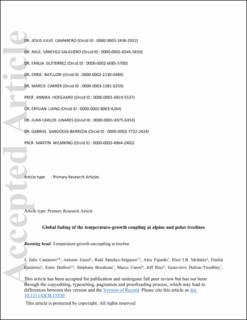Global fading of the temperature–growth coupling at alpine and polar treelines
Camarero, Jesús Julio; Gazol, Antonio; Sánchez-Salguero, Raúl; Fajardo, Alex; McIntire, Eliot J. B.; Gutiérrez, Emilia; Batllori, Enric; Boudreau, Stephane; Carrer, Marco; Diez, Jeff; Dufour-Tremblay, Geneviève; Gaire, Narayan P.; Hofgaard, Annika; Jomelli, Vincent; Kirdyanov, Alexander V.; Lévesque, Esther; Liang, Eryuan; Linares, Juan Carlos; Mathisen, Ingrid Ertshus; Moiseev, Pavel A.; Sangüesa-Barreda, Gabriel; Shrestha, Krishna B.; Toivonen, Johanna M.; Tutubalina, Olga V.; Wilmking, Martin
Journal article, Peer reviewed
Accepted version
Permanent lenke
https://hdl.handle.net/11250/2763774Utgivelsesdato
2021Metadata
Vis full innførselSamlinger
- Department of Biological Sciences [2235]
- Registrations from Cristin [9791]
Sammendrag
Climate warming is expected to positively alter upward and poleward treelines which are controlled by low temperature and a short growing season. Despite the importance of treelines as a bioassay of climate change, a global field assessment and posterior forecasting of tree growth at annual scales is lacking. Using annually resolved tree-ring data located across Eurasia and the Americas, we quantified and modeled the relationship between temperature and radial growth at treeline during the 20th century. We then tested whether this temperature–growth association will remain stable during the 21st century using a forward model under two climate scenarios (RCP 4.5 and 8.5). During the 20th century, growth enhancements were common in most sites, and temperature and growth showed positive trends. Interestingly, the relationship between temperature and growth trends was contingent on tree age suggesting biogeographic patterns in treeline growth are contingent on local factors besides climate warming. Simulations forecast temperature–growth decoupling during the 21st century. The growing season at treeline is projected to lengthen and growth rates would increase and become less dependent on temperature rise. These forecasts illustrate how growth may decouple from climate warming in cold regions and near the margins of tree existence. Such projected temperature–growth decoupling could impact ecosystem processes in mountain and polar biomes, with feedbacks on climate warming. climate warming, forest limit, growth model, mountain ecosystems, tree rings
